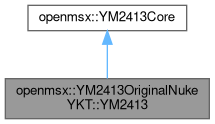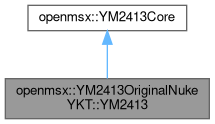#include <YM2413OriginalNukeYKT.hh>


Public Member Functions | |
| YM2413 () | |
| void | reset () override |
| Reset this YM2413 core. | |
| void | writePort (bool port, uint8_t value, int cycle_offset) override |
| Write to the YM2413 register/data port. | |
| void | pokeReg (uint8_t reg, uint8_t value) override |
| Write to a YM2413 register (for debug). | |
| uint8_t | peekReg (uint8_t reg) const override |
| Read from a YM2413 register (for debug). | |
| void | generateChannels (std::span< float *, 9+5 > out, uint32_t n) override |
| float | getAmplificationFactor () const override |
| Returns normalization factor. | |
| void | setSpeed (double speed) override |
| Sets real-time speed factor (aka the openMSX 'speed' setting). | |
| template<typename Archive > | |
| void | serialize (Archive &ar, unsigned version) |
 Public Member Functions inherited from openmsx::YM2413Core Public Member Functions inherited from openmsx::YM2413Core | |
| virtual | ~YM2413Core ()=default |
| virtual void | generateChannels (std::span< float *, 9+5 > bufs, unsigned num)=0 |
| Generate the sound output. | |
Additional Inherited Members | |
 Static Public Attributes inherited from openmsx::YM2413Core Static Public Attributes inherited from openmsx::YM2413Core | |
| static constexpr int | CLOCK_FREQ = 3579545 |
| Input clock frequency. | |
 Protected Member Functions inherited from openmsx::YM2413Core Protected Member Functions inherited from openmsx::YM2413Core | |
| YM2413Core ()=default | |
Detailed Description
Definition at line 14 of file YM2413OriginalNukeYKT.hh.
Constructor & Destructor Documentation
◆ YM2413()
| openmsx::YM2413OriginalNukeYKT::YM2413::YM2413 | ( | ) |
Definition at line 12 of file YM2413OriginalNukeYKT.cc.
References reset().
Member Function Documentation
◆ generateChannels()
|
override |
Definition at line 23 of file YM2413OriginalNukeYKT.cc.
References ranges::copy(), opll_t::cycles, opll_t::data, OPLL_Clock(), OPLL_Write(), and repeat().
Referenced by writePort().
◆ getAmplificationFactor()
|
overridevirtual |
Returns normalization factor.
The output of the generateChannels() method should still be amplified (=multiplied) with this factor to get a consistent volume level across the different implementations of the YM2413 core. This allows to internally calculate with native volume levels, and possibly results in slightly simpler and/or faster code. It's very likely that subsequent audio processing steps (like resampler, filters or volume adjustments) must anyway still multiply the output sample values, so this factor can be folded-in for free.
Implements openmsx::YM2413Core.
Definition at line 95 of file YM2413OriginalNukeYKT.cc.
◆ peekReg()
|
overridevirtual |
Read from a YM2413 register (for debug).
Note that the real YM2413 chip doesn't allow to read the registers. This returns the last written value or the default value if this register hasn't been written to since the last reset() call. Reading registers has no influence on the generated sound.
Implements openmsx::YM2413Core.
Definition at line 90 of file YM2413OriginalNukeYKT.cc.
◆ pokeReg()
|
overridevirtual |
Write to a YM2413 register (for debug).
Because of the timing constraint on writing registers via writePort(), writing registers via that way is not very suited for use in a debugger. Use this method as an alternative.
Implements openmsx::YM2413Core.
Definition at line 85 of file YM2413OriginalNukeYKT.cc.
◆ reset()
|
overridevirtual |
Reset this YM2413 core.
Implements openmsx::YM2413Core.
Definition at line 17 of file YM2413OriginalNukeYKT.cc.
References ranges::fill(), OPLL_Reset(), and opll_type_ym2413b.
Referenced by YM2413().
◆ serialize()
| void openmsx::YM2413OriginalNukeYKT::YM2413::serialize | ( | Archive & | ar, |
| unsigned | version | ||
| ) |
Definition at line 106 of file YM2413OriginalNukeYKT.cc.
◆ setSpeed()
|
overridevirtual |
Sets real-time speed factor (aka the openMSX 'speed' setting).
The default implementation does nothing. But e.g. the NukeYKT core needs this.
Reimplemented from openmsx::YM2413Core.
Definition at line 100 of file YM2413OriginalNukeYKT.cc.
◆ writePort()
|
overridevirtual |
Write to the YM2413 register/data port.
Writing to a register is a 2-step process: First write the register number to the register port (0), then write the value for that register to the data port (1). There are various timing constraints that must be taken into account (not described here).
We emulate the YM2413 as-if it generates a stream at 49.7kHz and at each step it produces one sample for each of the 9+5 sound channels. Though in reality the YM2413 spreads out the generation of the channels over time. So it's like a stream at 18 x 49.7kHz where the 9+5 channels have a fixed position in the 18 possible slots (so not all 18 slots produce a (non-zero) output).
In other words: we emulate the YM2413 18 steps at a time. Though for accurate emulation we still need to take the exact timing of register writes into account. That's what the 'offset' parameter is for. It must have a value [0..17] and indicates the sub-sample timing of the port-write.
Implements openmsx::YM2413Core.
Definition at line 62 of file YM2413OriginalNukeYKT.cc.
References ranges::fill(), and generateChannels().
The documentation for this class was generated from the following files: